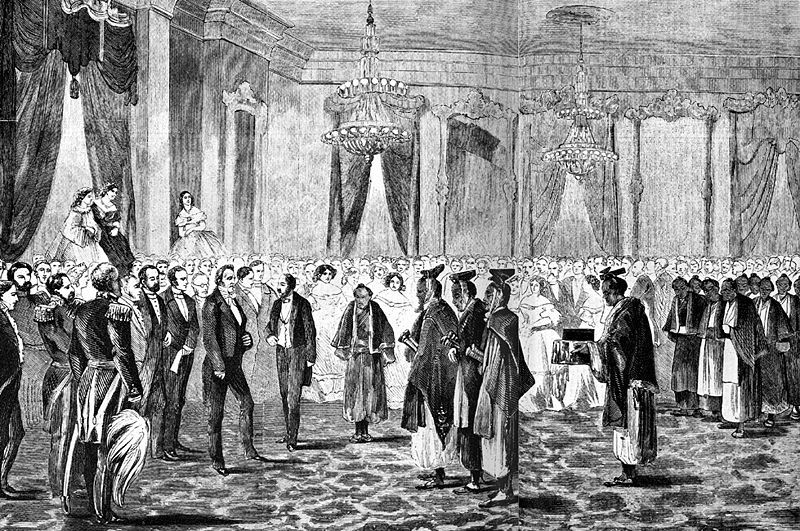 Or maybe not quite so reactionless but certainly a puzzle if true. Conventional rockets operate on the sound Newtonian principle that every action (in a vacuum where there are no other significant factors to consider) has an equal and opposite reaction. Essentially it’s an outgrowth of the concept that the total energy of a closed system does not change. If your closed system is you and some mass you can separate and propel away and the intitial state is that you are motionless with respect to each other and some arbitrary fixed point, when you propel that mass it does indeed move away from you but you also move away from it and also relative to your fixed point in proportion with the ratio of the mass you have acted on to you, and the velocity with which you have propelled it away.
Or maybe not quite so reactionless but certainly a puzzle if true. Conventional rockets operate on the sound Newtonian principle that every action (in a vacuum where there are no other significant factors to consider) has an equal and opposite reaction. Essentially it’s an outgrowth of the concept that the total energy of a closed system does not change. If your closed system is you and some mass you can separate and propel away and the intitial state is that you are motionless with respect to each other and some arbitrary fixed point, when you propel that mass it does indeed move away from you but you also move away from it and also relative to your fixed point in proportion with the ratio of the mass you have acted on to you, and the velocity with which you have propelled it away.
Up until Robert Goddard many scientists were under the misconception that you needed something to push against and that therefore flight in a space environment was impossible when it’s really not and quite conventional reactions will work provided you supply them with the chemicals needed (for instance liquid oxygen and kerosene).
However even advanced propulsion systems like Ion Drives rely on kinetic energy to create thrust. What makes them attractive and revolutionary is that they are very fuel efficient and can, since they operate fairly continuously compared to chemical rockets which go very fast initially and then coast the rest of the time, achieve quite high velocities… eventually.
What makes the EmDrive different is that it doesn’t seem to rely on kinetic energy at all.
Instead you set up a resonating microwave in a sealed cavity and out comes measurable thrust. Oh sure, you need to add energy to the system in the form of electricity, but solar panels are good for that so essentially you have a drive with an unlimited fuel supply.
How does it work? Nobody knows and the math to tune the microwave and the cavity is really tricky, but the parts are very cheap and almost every country that has a space program is examining prototypes.
What makes it news and not just some elaborate perpetual motion scam is that Martin Tajmar, professor and chair for Space Systems at the Dresden University of Technology who has a reputation for tracking down experimental error, has duplicated the previous results and is presenting a paper on it.
While it’s not some faster than light warp drive it does solve some fundamental problems in planetary exploration, NASA projects that even at modest output levels it could reduce the time needed for a probe to reach Pluto from 9 years to 18 months.
The ‘impossible’ EmDrive could reach Pluto in 18 months
by David Hambling, Wired
24 July 15
Last summer WIRED revealed that Nasa’s Eagleworks Lab was testing a copy of the EmDrive, a propulsion device frequently labelled as “impossible” because it appears to violate the law of conservation of momentum. Against all expectation they found it produced thrust. The response from the scientific community was dramatic, and generally sceptical — but the “anomalous thrust” stubbornly refuses to disappear as more research zeroes in on it.
…
(T)he subject is attracting serious examination from scientists who want to know if a sealed cavity filled with resonating microwaves can really produce net thrust. Previously the effect has been measured by British scientist Roger Shawyer, who invented the EmDrive, and a Chinese team, as well as Nasa.
…
(Tajmar)has investigated claims of “electrostatic torque,” a twisting force meant to occur between charged spheres, and found the supposed anomaly was due to a slight asymmetry in the experimental setup. His work on claims of gravitational shielding with spinning superconductors had led to a better understanding of sources of error in high-precision gyroscope measurements. These are cases where an apparatus apparently producing small anomalous forces needed to be examined closely.The same applies to the EmDrive. The obvious sources of error — air currents, leaking microwaves, ionisation — have long ago been ruled out. But this is the first time that someone with a well-equipped lab and a strong background in tracking experimental error has been involved, rather than engineers who may be unconsciously influenced by a desire to see it work.
Science Oriented Video
The law that entropy always increases holds, I think, the supreme position among the laws of Nature. If someone points out to you that your pet theory of the universe is in disagreement with Maxwell’s equations – then so much the worse for Maxwell’s equations. If it is found to be contradicted by observation – well, these experimentalists do bungle things sometimes. But if your theory is found to be against the second law of thermodynamics I can give you no hope; there is nothing for it but to collapse in deepest humiliation.
–Sir Arthur Stanley Eddington, The Nature of the Physical World (1927)
Science News and Blogs
- Unearthing Jamestown’s Leaders, and a Mystery, By NICHOLAS FANDOS, The New York Times
- Anoles Going Strong on Hispaniola Millions of Years Later, By JAMES GORMAN, The New York Times
- ‘The Bomb’ Helps Return Nukes to the TV Spotlight, By NEIL GENZLINGER, The New York Times
- Astronomers find aurora a million times brighter than the northern lights, by Ian Sample, The Guardian
- Pluto’s flowing ice and mysterious red haze highlight ‘a scientific wonderland’, by Alan Yuhas, The Guardian
- French student finds tooth dating back 560,000 years, by Angelique Chrisafis, AFP
- Everyone’s A Bad Guy: German Regulator Orders Facebook To Drop Its Stupid ‘Real Name’ Policy, by Timothy Geigner, Tech Dirt
- Washington Post Publishes… And Then Unpublishes… Opinion Piece By Ex-Intelligence Industry Brass, In Favor Of Strong Encryption, by Mike Masnick, Tech Dirt
- Reminder: When Ron Wyden Says There’s A Secret Interpretation Of A Law, Everyone Should Pay Attention, by Mike Masnick, Tech Dirt
- Pendulum, Pendulum On The Wall: This ‘Odd Kind Of Sympathy’ Syncs Them All, by Kevin Knudson, Forbes
Obligatories, News and Blogs below.





Recent Comments